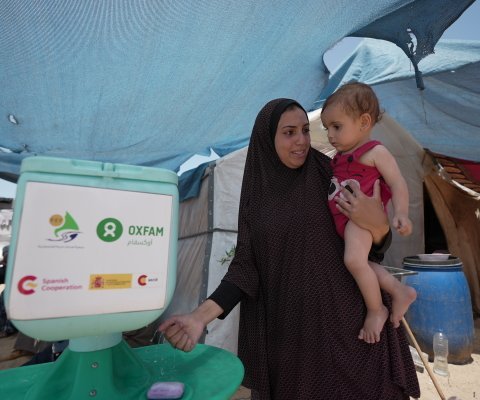(WASHINGTON, DC) Oxfam America and CNA warned that the US is likely to face substantially increasing demands on its humanitarian response systems as a result of climate change. The organizations proposed a set of US government reforms to increase the effectiveness and efficiency of US disaster response and preparedness -- especially an ‘ounce of prevention’ approach to disaster planning.
In a new joint report released today, the two organizations outlined how climate change will likely decrease agricultural output, displace populations from coastlines, change access to water resources, and increase the frequency of disease outbreaks, leading to increased need for humanitarian assistance, often with serious security implications.
“Climate change will likely bring about more disasters, greater economic stress and increased migration, which can exacerbate instability, particularly in already fragile states,” said Dr. E.D. McGrady, Research Analyst with CNA and co-author of the report.
South Asia and sub-Saharan Africa, the regions most likely to experience food and water insecurity as a consequence of climate change, are also home to a number of ongoing conflicts. Societies that lack the resources to adapt to these changes may suffer significant decreases in overall economic output, potentially increasing the likelihood of local or regional conflict.
“Building resilience and reducing vulnerabilities are key and cost-effective ways to lower future resource demands,” said Dr. Marc Cohen, Senior Researcher with Oxfam America and co-author of the report.
“Numerous analyses also show the economic benefits of strategies focused on reducing the risks from disasters, with a ‘return on investment’ much less than for reactive humanitarian assistance.”
Nevertheless, between 1999 and 2008, just 0.4% of total global development assistance supported disaster prevention and preparedness, according to the report. Current U.S. government institutional and budgetary arrangements do not adequately support resilience building and disaster prevention.
“Climate change is happening now and we must make the necessary investments to address its impacts,” said Vice Admiral Lee Gunn, USN (Ret.), President of CNA’s Institute for Public Research and Vice Chairman of the CNA Military Advisory Board. “Such investments now would significantly reduce long-term costs of humanitarian response, limit strains on our military and civilian capacity, and lay a stronger foundation for stability in developing countries.”
“To handle the coming storm, the US. must create a coherent, whole-of-government approach to disaster response and planning, led by the civilian agencies – especially the Office of Foreign Disaster Assistance – that have the greatest expertise in tackling these challenges,” said Paul O'Brien, Vice President for Policy and Campaigns with Oxfam America.
The report is available here.





